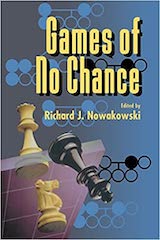
|
FreeComputerBooks.com
Links to Free Computer, Mathematics, Technical Books all over the World
|
|
- Title: Games of No Chance
- Author(s) Richard J. Nowakowski (Editor)
- Publisher: Cambridge University Press (November 13, 1998)
- Paperback: 552 pages
- eBook: PDF and PostScript Files
- Language: English
- ISBN-10: 0521646529
- ISBN-13: 978-0521646529
- Share This:

|
Is Nine-Men's Morris, in the hands of perfect players, a win for white or for black--or a draw? Can king, rook, and knight always defeat king and two knights in chess? What can Go players learn from economists? What are nimbers, tinies, switches, minies? This book deals with combinatorial games, that is, games not involving chance or hidden information. Their study is at once old and young: though some games, such as chess, have been analyzed for centuries, the first full analysis of a nontrivial combinatorial game (Nim) only appeared in 1902.
This book deals with combinatorial games, that is, games not involving chance or hidden information. Their study is at once old and young: though some games, such as chess, have been analyzed for centuries, the first full anlaysis of a nontrivial combinatorial game (Nim) only appeared in 1902.
About the Authors- N/A
- Game Theory
- Combinatorics
- Financial Mathematics and Economics
- Applied Mathematics
- Statistics
- Probability and Stochastic Process
- Operations Research and Optimization Books
 Similar Books:
Similar Books:
-
 Introduction to Game Theory: a Discovery Approach
Introduction to Game Theory: a Discovery Approach
This book includes an exploration of the ideas of Game Theory through the rich context of popular culture. It contains sections on applications of the concepts to popular culture. It suggests films, television shows, and novels with themes from game theory.
-
 Game Theory: An Open Access Textbook (Giacomo Bonanno)
Game Theory: An Open Access Textbook (Giacomo Bonanno)
This book is an introduction to Game Theory. Accessible to anybody with minimum knowledge of mathematics and no prior knowledge of game theory, yet it is also rigorous and includes several proofs.
-
 Game Theory Relaunched (Hardy Hanappi)
Game Theory Relaunched (Hardy Hanappi)
The game is on. Do you know how to play? Game Theory sets out to explore what can be said about making decisions which go beyond accepting the rules of a game. New simulation tools and network analysis have made game theory omnipresent these days.
-
 Algorithmic Game Theory (Noam Nisan, et al)
Algorithmic Game Theory (Noam Nisan, et al)
This book covers many of the hottest area of useful new Game Theory research, introducing deep new problems, techniques, and perspectives that demand the attention of economists as well as computer scientists.
-
 More Games of No Chance (Richard J. Nowakowski)
More Games of No Chance (Richard J. Nowakowski)
This book by some of the top names in the field is a state-of-the-art look at combinatorial games. give information helpful in playing or analyzing the games, and some go so far as to give explicit strategies for solving them.
-
 Games of No Chance 3 (Michael H. Albert, et al)
Games of No Chance 3 (Michael H. Albert, et al)
This fascinating look at combinatorial games, that is, games not involving chance or hidden information, offers updates on standard games such as Go and Hex, on impartial games such as Chomp and Wythoff's Nim, etc.
-
 Game Theory: A Nontechnical Introduction
Game Theory: A Nontechnical Introduction
Striking an appropriate balance of mathematical and analytical rigor, it teaches game theory by examples - serves as an introduction to game theory for students with no prior game theory knowledge, or with limited background in economics and mathematics.
-
 Logic and the Foundations of Game and Decision Theory
Logic and the Foundations of Game and Decision Theory
This book collects together revised papersoriginally presented at the 7th Conference onLogic and the Foundations of Game and DecisionTheory (LOFT). LOFT is a key venue forpresenting research at the intersection of logic,economics and computer science.
-
 Magic Squares and Cubes (William Symes Andrews)
Magic Squares and Cubes (William Symes Andrews)
This book cover topics such as magic squares, magic cubes, the Franklin squares, magics and Pythagorean numbers, the theory of reversions, magic circles, spheres, and stars, and magic octahedroids, among other things.
-
 Game Theory (Qiming Huang)
Game Theory (Qiming Huang)
This book provides a powerful mathematical framework that can accommodate the preferences and requirements of various stakeholders in a given process as regards the outcome of the process.





